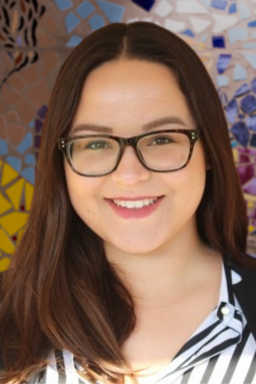MSW Student Organizes Discussion on Abolition

February 24, 2022
(HOUSTON, TX) - Karin Simpson, an MSW Student and Graduate Assistant for the Field Education Office, organized and led a recent Field Focus Connection, a monthly discussion for students on topics within the field of social work and social work education.
We spoke with Karin about why she chose to lead a discussion on abolition and how she sees the topic within the context of social work history and education.
----
Name: Karin Simpson
Pronouns: she/hers
Program and Expected Graduation Year: MSW 2023
Great work organizing the Field Focus Connection. Why did you decide to discuss abolition?
I think it is essential to discuss all things that may impact the lives of the people and communities we, as social workers, serve. We have seen how the industrial prison complex has impacted Black and Brown communities for years. I sought to create a place where, as social workers in training, we can learn together, challenge each other, and communicate.
What was your introduction to abolition at the GCSW?
I was first introduced to abolition at the GCSW through our summer reading Bird Uncaged: An Abolitionist's Freedom Song by Marlon Peterson. When Marlon Peterson spoke at Speaking of Social Justice in September 2021, I continued learning about abolition and transformative justice.
I am also very fortunate to be in a very outspoken cohort that is very aware of abolition and its potential impact in creating positive change. One of our professors, in particular, allowed us the space to engage in this type of discussion. Overall, my experiences at the GCSW have allowed me to explore this topic, and I'm excited to see what else the college has to offer us so that we can continue to learn and engage.
What surprised you the most when it came to researching the topic of abolition?
I think I was surprised by how closely abolition is related to everything. We learned about abolition in our history classes during middle school and high school. Still, we did not see its progression through history and its role in issues we face today, such as the mass incarceration of formerly enslaved people. There is still so much to learn and do, and there always has to be a starting point. I think that researching this topic was my starting point.
Many social work students, practitioners, and educators have been exploring abolition in the last two years. Why do you think that is, and why is it essential for social work students to better understand the concept of abolition?
It's important because it affects the lives of those around us, whether we interact with those impacted directly or not. The beginning of the disenfranchisement of various communities directly links to the formation of this country. To be aware and learn this fact is powerful. This acknowledgment of history allows social work students to start initiating change, challenging the current systems, collaborating with abolitionist organizations, and keeping the concept of abolition going until equality and equity.
Who is someone that inspired you to continue your education in social work?
I don't think there was only one individual. I think my interactions with those around me and what I learned in school (elementary/primary to undergrad) pushed me toward social work. I always knew I wanted to work with people in a more hands-on way, and I think social work allows for that. It's a facilitating field, whether it's facilitating empowerment, facilitating change, or facilitating pathways towards justice.
Our vision is to achieve social justice at every level. What role does social work education and abolition play in achieving that vision?
Education is one of the most effective means of developing a more equitable society. I believe that integrating abolition into our curriculum is even more critical than delivering course materials rooted solely in social work. Suppose we, as social workers, seek to achieve social justice at every level. In that case, we must always be aware of the repercussive damages these systems may cause, especially if these systems sustain great harm to the communities we aim to serve.
What has been a highlight of your educational experience thus far at the GCSW?
The challenges. The GCSW has challenged me in so many ways and helped me with concepts that I was unaware of, such as abolition.
What are your career aspirations once you graduate, and what role do you think abolition will play in your career choice?
I hope to work at a community college to interact with a wide variety of college students. College is a place to learn and expand horizons. I would love to have college-wide lectures/sessions to teach about the concept of abolition and create discussions among students, faculty, and staff.